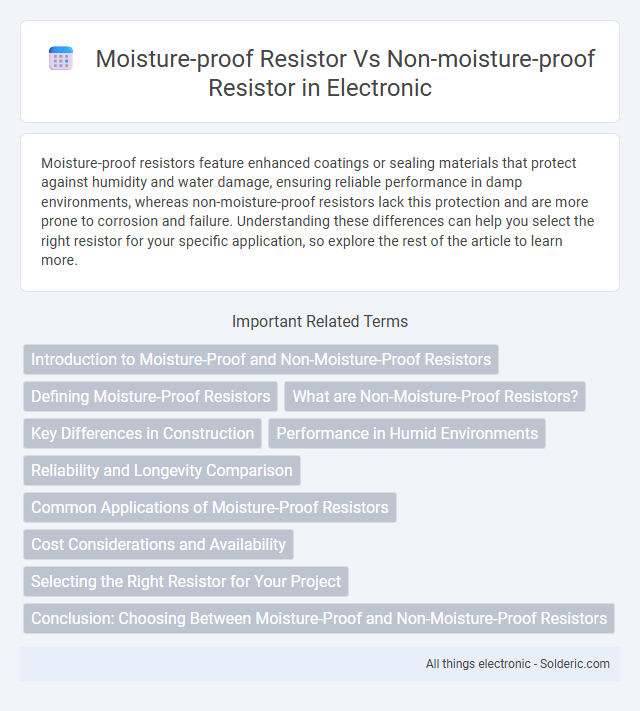Moisture-proof resistors feature enhanced coatings or sealing materials that protect against humidity and water damage, ensuring reliable performance in damp environments, whereas non-moisture-proof resistors lack this protection and are more prone to corrosion and failure. Understanding these differences can help you select the right resistor for your specific application, so explore the rest of the article to learn more.
Comparison Table
| Feature | Moisture-Proof Resistor | Non-Moisture-Proof Resistor |
|---|---|---|
| Moisture Resistance | High resistance to humidity and water ingress | Low to no resistance to moisture exposure |
| Durability | Enhanced lifespan in humid environments | Reduced lifespan when exposed to moisture |
| Applications | Outdoor electronics, automotive, industrial equipment | Indoor, dry environmental conditions |
| Material Coating | Specialized moisture-resistant coatings (e.g., protective epoxy) | Standard coatings without moisture protection |
| Cost | Higher due to specialized manufacturing and materials | Lower manufacturing cost |
| Performance Stability | Consistent resistance values under humid conditions | Resistance may drift or degrade with moisture exposure |
Introduction to Moisture-Proof and Non-Moisture-Proof Resistors
Moisture-proof resistors are engineered with coatings or materials that protect against humidity and water exposure, ensuring stable performance in damp environments. Non-moisture-proof resistors lack this protective layer, making them more susceptible to damage, corrosion, and electrical failure when exposed to moisture. Understanding the difference helps you select the right resistor type for reliable operation in your specific environmental conditions.
Defining Moisture-Proof Resistors
Moisture-proof resistors are specialized electronic components designed to resist damage and maintain stable resistance values in high-humidity or wet environments. These resistors typically feature protective coatings or materials that prevent moisture ingress, ensuring reliable performance and longevity. In contrast, non-moisture-proof resistors lack such protective measures, making them vulnerable to corrosion, increased resistance, and potential failure when exposed to moisture.
What are Non-Moisture-Proof Resistors?
Non-moisture-proof resistors lack protective coatings that shield them from humidity and condensation, making them susceptible to performance degradation and failure in high-moisture environments. These resistors typically feature exposed resistive elements or basic insulating materials that allow moisture to infiltrate, causing increased leakage current, resistance drift, and potential short circuits. Suitable primarily for dry, controlled conditions, non-moisture-proof resistors are less reliable in applications requiring long-term stability under varying environmental stresses.
Key Differences in Construction
Moisture-proof resistors feature a special coating or encapsulation that protects their internal components from humidity and water ingress, enhancing reliability in damp environments. Non-moisture-proof resistors lack this protective layer, making them more susceptible to performance degradation and failure due to moisture exposure. Your choice depends on the operating environment, where moisture-proof resistors are essential for maintaining stability in high-humidity applications.
Performance in Humid Environments
Moisture-proof resistors maintain stable resistance and reliable performance in humid environments by using protective coatings that prevent water absorption and corrosion. Non-moisture-proof resistors are prone to resistance drift, short circuits, and potential failure when exposed to high humidity or condensation. Ensuring your circuit uses moisture-proof resistors enhances durability and accuracy in moisture-prone applications.
Reliability and Longevity Comparison
Moisture-proof resistors offer significantly higher reliability and longevity compared to non-moisture-proof resistors due to their enhanced protection against humidity and environmental contaminants, which reduces the risk of corrosion and electrical failure. These resistors maintain stable resistance values and performance in harsh conditions, extending your device's operational lifespan and ensuring consistent functionality. Non-moisture-proof resistors tend to degrade faster in moisture-rich environments, leading to increased failure rates and reduced durability over time.
Common Applications of Moisture-Proof Resistors
Moisture-proof resistors are widely used in outdoor electronics, automotive sensors, and medical devices due to their ability to withstand high humidity and prevent corrosion. These resistors ensure stable performance in harsh environments, including industrial control systems and telecommunications equipment exposed to moisture. Non-moisture-proof resistors, by contrast, are typically reserved for dry, controlled environments where exposure to moisture is minimal.
Cost Considerations and Availability
Moisture-proof resistors typically have a higher cost due to specialized coatings and materials designed to prevent corrosion and maintain performance in humid environments. Non-moisture-proof resistors are generally more affordable and widely available, making them suitable for applications where moisture exposure is minimal or controllable. When selecting components for your project, consider the environmental conditions to balance cost efficiency with reliability.
Selecting the Right Resistor for Your Project
Moisture-proof resistors are designed with special coatings and materials to prevent moisture ingress, ensuring reliable performance in humid or wet environments, unlike non-moisture-proof resistors which may degrade or fail under such conditions. Selecting the right resistor for your project involves evaluating the operating environment's humidity levels and potential exposure to moisture to avoid circuit malfunctions or reduced component lifespan. Choosing moisture-proof resistors enhances durability and stability, especially in outdoor, automotive, or industrial applications where moisture exposure is common.
Conclusion: Choosing Between Moisture-Proof and Non-Moisture-Proof Resistors
Moisture-proof resistors offer enhanced reliability and stability in high-humidity or harsh environments by preventing corrosion and electrical degradation. Non-moisture-proof resistors may suffice for dry, controlled conditions but risk performance loss and shortened lifespan when exposed to moisture. Selecting the appropriate resistor depends on environmental factors and application requirements, prioritizing durability in moisture-prone settings.
moisture-proof resistor vs non-moisture-proof resistor Infographic

 solderic.com
solderic.com